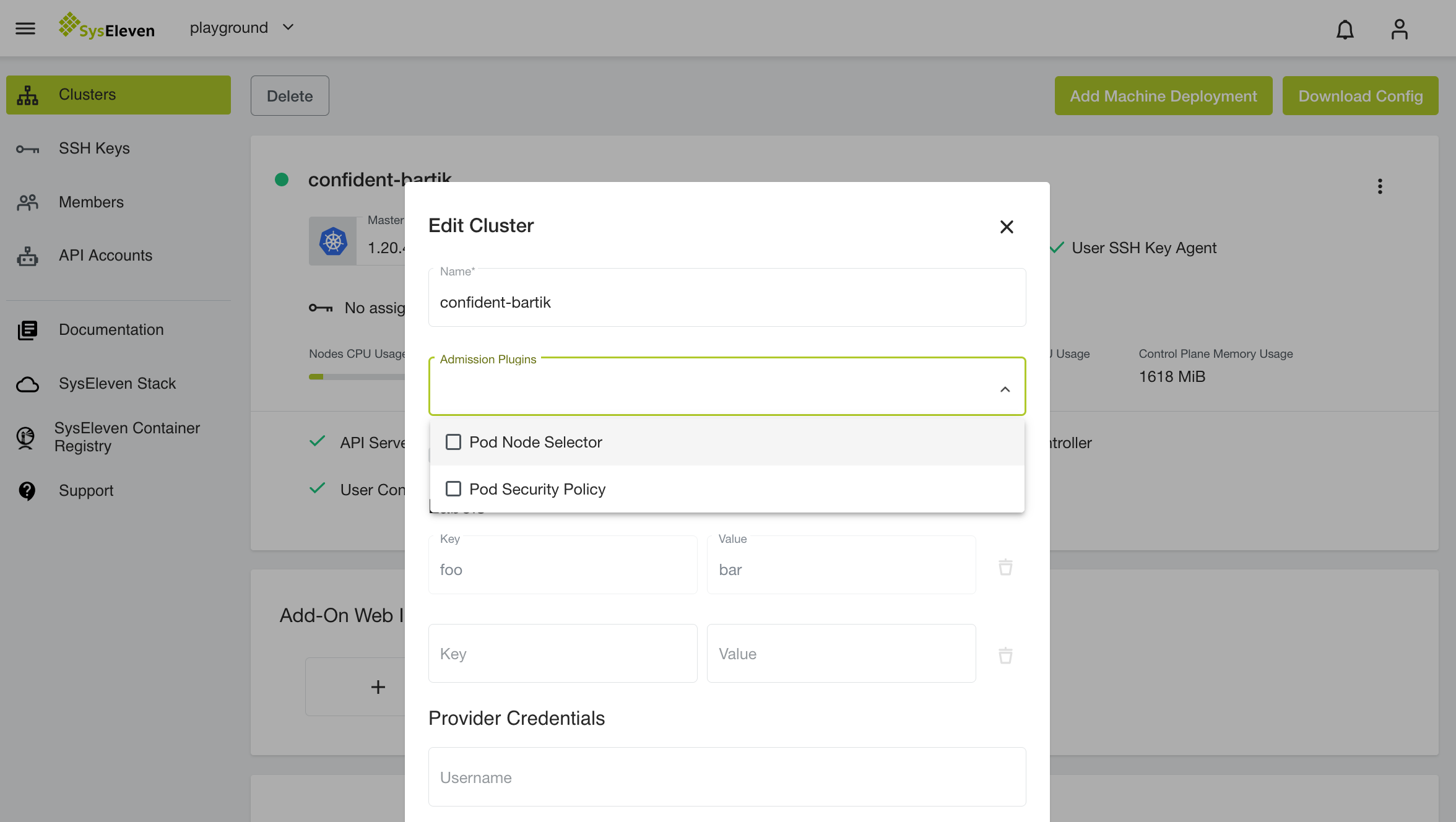Pod Security Policy
PodSecurityPolicy is deprecated starting with Kubernetes 1.21.0 and will be removed completely in 1.25.0.
That is to say, they will continue to work in 1.21, 1.22, 1.23 and 1.24. Only then will you have to replace them.
Please read the Kubernetes documentation for more details.
By default Pod Security Policies are deactivated in MetaKube clusters, but you can optionally activate them on the cluster detail page in the dashboard. Pod Security Policies allow you to specify fine-grained authorization settings for Pod creation and updates.
If you activate Pod Security Policy, a lot of Pod specifications, Operators and Helm charts will not work out of the box anymore. Only activate it if you know what you are doing.
Configuring Pod Security Policy
You can activate Pod Security Polices on the cluster creation page by selecting it from list of Admission Plugins or in Edit Cluster modal:

How does it work
The Kubernetes documentation has a detailed article about Pod Security Policies. You should read this before activating the feature.
Example
After activating Pod Security Policies, every Pod needs a Policy in order to be started or updated.
If you create a new deployment:
cat <<'EOF' | kubectl apply --namespace default -f -
kind: Deployment
apiVersion: apps/v1
metadata:
name: nginx-hello
spec:
replicas: 3
selector:
matchLabels:
app: nginx-hello
template:
metadata:
labels:
app: nginx-hello
spec:
containers:
- name: nginx-hello
image: nginxdemos/hello:0.2
livenessProbe:
httpGet:
path: /
port: 80
timeoutSeconds: 1
readinessProbe:
httpGet:
path: /
port: 80
timeoutSeconds: 1
EOFYou can see that the Deployment and a subsequent ReplicaSet were created, but the pods were not:
$ kubectl describe replicaset nginx-hello-f4cb7b776 --namespace default
Name: nginx-hello-f4cb7b776
Namespace: default
Selector: app=nginx-hello,pod-template-hash=f4cb7b776
Labels: app=nginx-hello
pod-template-hash=f4cb7b776
Annotations: deployment.kubernetes.io/desired-replicas: 3
deployment.kubernetes.io/max-replicas: 4
deployment.kubernetes.io/revision: 1
Controlled By: Deployment/nginx-hello
Replicas: 0 current / 3 desired
Pods Status: 0 Running / 0 Waiting / 0 Succeeded / 0 Failed
Pod Template:
Labels: app=nginx-hello
pod-template-hash=f4cb7b776
Containers:
nginx-hello:
Image: nginxdemos/hello:0.2
Port: <none>
Host Port: <none>
Liveness: http-get http://:80/ delay=0s timeout=1s period=10s #success=1 #failure=3
Readiness: http-get http://:80/ delay=0s timeout=1s period=10s #success=1 #failure=3
Environment: <none>
Mounts: <none>
Volumes: <none>
Conditions:
Type Status Reason
---- ------ ------
ReplicaFailure True FailedCreate
Events:
Type Reason Age From Message
---- ------ ---- ---- -------
Warning FailedCreate 1s (x15 over 83s) replicaset-controller Error creating: pods "nginx-hello-f4cb7b776-" is forbidden: unable to validate against any pod security policy: []To make the Pods scheduable, you have to create a PodSecurityPolicy and bind it to the ServiceAccount running this Pod with a Role and RoleBinding or ClusterRole and ClusterRoleBinding. The following example creates a very restricted PodSecurityPolicy and binds it to all ServiceAccounts in the default namespace:
cat <<'EOF' | kubectl apply -f -
apiVersion: policy/v1beta1
kind: PodSecurityPolicy
metadata:
name: psp-restricted
annotations:
seccomp.security.alpha.kubernetes.io/allowedProfileNames: 'docker/default,runtime/default'
apparmor.security.beta.kubernetes.io/allowedProfileNames: 'runtime/default'
seccomp.security.alpha.kubernetes.io/defaultProfileName: 'runtime/default'
apparmor.security.beta.kubernetes.io/defaultProfileName: 'runtime/default'
spec:
privileged: false
# Required to prevent escalations to root.
allowPrivilegeEscalation: false
# This is redundant with non-root + disallow privilege escalation,
# but we can provide it for defense in depth.
requiredDropCapabilities:
- ALL
# Allow core volume types.
volumes:
- 'configMap'
- 'emptyDir'
- 'projected'
- 'secret'
- 'downwardAPI'
# Assume that persistentVolumes set up by the cluster admin are safe to use.
- 'persistentVolumeClaim'
hostNetwork: false
hostIPC: false
hostPID: false
runAsUser:
# Require the container to run without root privileges.
rule: 'MustRunAsNonRoot'
seLinux:
# This policy assumes the nodes are using AppArmor rather than SELinux.
rule: 'RunAsAny'
supplementalGroups:
rule: 'MustRunAs'
ranges:
# Forbid adding the root group.
- min: 1
max: 65535
fsGroup:
rule: 'MustRunAs'
ranges:
# Forbid adding the root group.
- min: 1
max: 65535
readOnlyRootFilesystem: false
---
apiVersion: rbac.authorization.k8s.io/v1
kind: Role
metadata:
name: psp:default
namespace: default
rules:
- apiGroups: ['policy']
resources: ['podsecuritypolicies']
verbs: ['use']
resourceNames:
- psp-restricted
---
apiVersion: rbac.authorization.k8s.io/v1
kind: RoleBinding
metadata:
name: psp:default
namespace: default
roleRef:
kind: Role
name: psp:default
apiGroup: rbac.authorization.k8s.io
subjects:
# Authorize all service accounts
- kind: Group
apiGroup: rbac.authorization.k8s.io
name: system:serviceaccounts
EOFTo force Kubernetes to retry creating the Pods directly instead of waiting for the back-off interval, you can delete the existing ReplicaSet. A new ReplicaSet will be automatically created because of the Deployment:
kubectl delete replicaset nginx-hello-f4cb7b776 --namespace defaultThe pods can now be created:
$ kubectl get pods --namespace default
NAME READY STATUS RESTARTS AGE
nginx-hello-f4cb7b776-4wgf7 0/1 ContainerCreating 0 8s
nginx-hello-f4cb7b776-mgcwn 0/1 ContainerCreating 0 8s
nginx-hello-f4cb7b776-tnsl6 0/1 ContainerCreating 0 8s